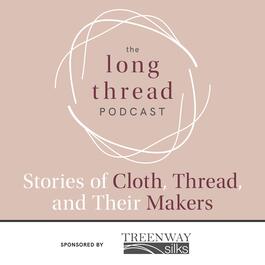
The Nettle Dress is available to stream online (https://watch.eventive.org/nettledressfilm/play/66fd50e5edab64004eb9dd5f) from November 15–December 2, 2024. Most of us avoid nettles, thinking of them as weeds whose little stinging hairs can inject a painful toxin into the unexpecting walker. But strolling through the woods near his home in England, Allan Brown was captivated by the tall native plants. Knowing that textile cultures across the world have produced cloth from nettles, he wanted to learn more about cloth made with nettle fiber. Except for a few exceptions—giant Himalayan nettles and ramie, which is a non-stinging plant in the nettle family—the era of nettle textiles is over. But thousands of years ago, nettle cloth and cordage fulfilled human needs for garments and tools. Like other ancient textiles, nettle cloth has almost entirely disappeared, rotted away and returned to the soil. Allan knew that the only way to experience cloth made from nettle would be to create it himself, so he set about processing, spinning, and weaving fabric from stands of nettles that grew wild in the woods. Before he could get down to cloth-making, though, he had to learn how to extract the fiber from the plant—a process without contemporary documentation or a skilled teacher. (The stinging parts of the plant are removed during processing, so textiles made from nettle fiber feel more like cotton or linen than stinging barbs.) He learned to spin, which proved not only the most time-consuming but also the most meaningful part of the project. “I just found spinning so therapeutic,” he says. He felt the solace of handspinning keenly when his wife, Alex, passed away over the course of his nettle exploration. In the aftermath of Alex dying, my world grew very small, my perimeters drew in, and I was just looking after the family. Sometimes my only connection to a wider world was just going out and collecting nettles, but it was within a really small geographical margin. So I think events sort of led me to, rather than looking for bigger and more, I tuned into the familiar, going in deeper and seeing what I could find and what I’d previously overlooked. And realizing, oh my goodness—all these plants, they provide dyes, these plants provide fibers, and they’re all there right on my doorstep and have been under my nose all along. So it feels like it’s really connected me to a sense of place in a much deeper way than perhaps I had been before. As he spun years’ worth of yarn, Allan decided that the nettle project would culimate in a dress. A simple shape, cut efficiently from a narrow width of cloth, would be enough to create a dress for his daughter Oonagh, so he wove yards of plain-weave fabric and even spun the sewing thread to stitch the piece together. Seven years after his first experiments with nettle fiber, he slipped a handmade nettle dress over her head. Following Allan on his exploration, his film-director friend Dylan Howitt captured the stages of the process and has released a film called The Nettle Dress. (https://www.nettledress.org/) The film has been released in a number of markets, including the United Kingdom, and some audiences have been fortunate to meet the fiber artist and even touch the dress at a screening. The story of the dress and its creator remind us that the long history of foraged, handmade cloth can be ours again if we have the dedication to revive it. Links The Nettle Dress film website (https://www.nettledress.org/) The Nettle Dress on Instagram (https://www.instagram.com/nettledressfilm/) "The Nettle Dress: A Tale of Love and Healing (https://spinoffmagazine.com/the-nettle-dress/) review by Linda Ligon Nettles for Textiles Facebook group (https://www.facebook.com/groups/1648679398499874/) Nettles for Textiles web page (http://www.nettlesfortextiles.org.uk/wp/) From Sting to Spin, a History of Nettle Fibre (https://gillianedomsbook.blogspot.com/p/buy-book.html) by Gillian Edom This episode is brought to you by: Treenway Silks is where weavers, spinners, knitters and stitchers find the silk they love. Select from the largest variety of silk spinning fibers, silk yarn, and silk threads & ribbons at TreenwaySilks.com (https://www.treenwaysilks.com/). You’ll discover a rainbow of colors, thoughtfully hand-dyed in Colorado. Love natural? Treenway’s array of wild silks provide choices beyond white. If you love silk, you’ll love Treenway Silks, where superior quality and customer service are guaranteed. You’re ready to start a new project but don’t have the right yarn, or you have the yarn but not the right tool. Yarn Barn of Kansas can help! They stock a wide range of materials and equipment for knitting, weaving, spinning, and crochet. They ship all over the country, usually within a day or two of receiving the order. Plan your project this week, start working on it next week! See yarnbarn-ks.com (https://www.yarnbarn-ks.com/) to get started. Knitters know Manos del Uruguay for their yarns’ rich tonal colors, but the story of women’s empowerment and community benefit enriches every skein. Discover 17 yarn bases from laceweight to super bulky made and dyed at an artisan owned cooperative in Uruguay. Ask for Manos at your local retailer or visit FairmountFibers.com (https://fairmountfibers.com/). Creating consciously crafted fibers and patterns is more than just a focus for Blue Sky Fibers, it’s their passion. Ever since they started with a small herd of alpacas in a Minnesota backyard, they’ve been committed to making yarn in the best way possible to show off its natural beauty. While their exclusive offerings have grown beyond alpaca to include wool, organic cotton, and silk, their desire for exciting makers about natural fibers hasn’t changed one bit. It all winds back to the yarn, ensuring that every precious, handmade hank is lovingly filled with endless inspiration. blueskyfibers.com (https://blueskyfibers.com/)
From "The Long Thread Podcast"


Comments
Add comment Feedback